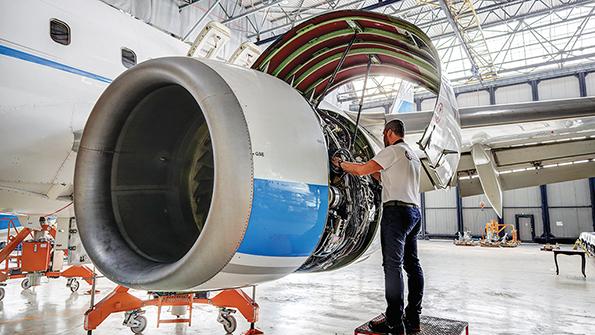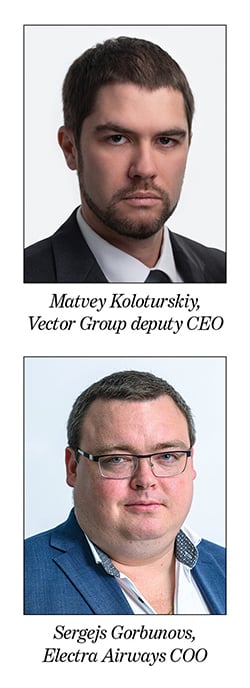
Electra Airways utilizes its ETG Maintenance partner for most of its in-house MRO requirements.
Matvey Koloturskiy, deputy CEO of Electra Airways’ parent company, Vector Group, and Sergejs Gorbunovs, Electra’s chief operating officer, discuss how the Bulgarian charter and ACMI airline plans its maintenance.
How is the Eastern Europe region recovering in 2023? Where is the growth in cargo markets? Koloturskiy: In terms of demand, the Eastern European region is recovering strongly. We see it especially in Poland, where we work a lot with ITAKA, the biggest Polish tour operator, and operate a lot of routes on behalf of Enter Air. However, being a charter and ACMI [aircraft, crew, maintenance and insurance] airline, we work not only in Eastern Europe, but all across the [Europe, Middle East and Africa] region. The demand for ACMI services has increased significantly almost everywhere and is now a trend among even big regular carriers. Of course, it may decline; however, we consider that demand will be solid in the short and medium term.
 What are the key fundamentals of Electra Airways’ maintenance strategy? Koloturskiy: Having forecast a few years ago an upcoming shortage of manpower and likely difficulties for various MROs worldwide, it was decided that all maintenance activities of Electra Airways must be performed in-house. Starting last year, Electra Airways is a part of Vector Group, an international aviation holding consortium comprised of four sister companies. One of them is the MRO ETG Maintenance, located in Varna, Bulgaria. The company is fully certified to perform all types of checks for Airbus A320-family classic and Boeing 737NG aircraft. We are now seeing that this decision was correct, as performing all maintenance within the holding company framework allows us to be very flexible and to have a 100% guarantee against unforeseen events and surprises.
What are the key fundamentals of Electra Airways’ maintenance strategy? Koloturskiy: Having forecast a few years ago an upcoming shortage of manpower and likely difficulties for various MROs worldwide, it was decided that all maintenance activities of Electra Airways must be performed in-house. Starting last year, Electra Airways is a part of Vector Group, an international aviation holding consortium comprised of four sister companies. One of them is the MRO ETG Maintenance, located in Varna, Bulgaria. The company is fully certified to perform all types of checks for Airbus A320-family classic and Boeing 737NG aircraft. We are now seeing that this decision was correct, as performing all maintenance within the holding company framework allows us to be very flexible and to have a 100% guarantee against unforeseen events and surprises.
How are you readying your maintenance operation for any future fleet growth? Koloturskiy: Electra Airways plans to increase its fleet from the current eight Airbus and one Boeing aircraft to 15 A320-family aircraft in the next 18-24 months. While Electra Airways is growing fast, we all know that the growth of an airline must be managed wisely. We will need some time to stabilize at that level and will announce future growth plans after that. We plan to stick to the same strategy and to continue focusing on in-house maintenance coverage for this fleet expansion. ETG Maintenance has a component shop, based in Sofia, where we repair and overhaul wheels, brakes, emergency slides and various other components for our own airline and also for third parties from Bulgaria and other countries in the region. At the moment we are working on further development of our component shop capability to increase the number of technologies and [part numbers] that we are able to maintain by ourselves, mainly in C5, C6, C14, C15, C18 ratings. We expect to announce other new capabilities in a couple of months.
Labor challenges are severely impacting the industry. What is your experience with these challenges and how do you think Electra and the wider industry can overcome them? Koloturskiy: Our MRO, as well as the technical part of an airline, is affected by manpower challenges. However, we are trying to be as creative as possible to overcome them. A key element of our long-term strategy is to build partnerships with top Bulgarian technical universities, which will allow students to get internships within our organizations and to begin developing their careers in Vector Group. We strongly believe that investments in people and their professional education is a solid basis for our future development.
Gorbunovs: Electra Airways is looking for young, talented engineers who may join various teams—including the maintenance control center, planning, as well as engineering departments. A growing airline is a fantastic opportunity both for young and experienced specialists to become a part of various development projects, which will be harder to find at bigger and more established carriers. More or less the same approach is applicable for MRO. ETG Maintenance offers vast opportunities for technicians and engineers to upgrade their skills and also to become midlevel and C-suite managers much faster than in other more established MROs.
Have you been impacted by a shortage of spare engines and related OEM and used serviceable material parts? Koloturskiy: As of today, Electra Airways is not affected by engine issues, as Vector Group has purchased a few engines, which are used as a backup for the operational needs of our airline. We expect supply chain issues to continue for 2-3 more years and we are building our analyses based on that assumption. Unfortunately, all airlines and MROs need to invest much more now in inventory and to maintain spare parts stock levels. However, this is necessary in order to be able to provide a good service level for our customers. Vector Group has invested in purchasing spare parts, which are allocated in Bulgaria and across our line stations. In the last few months, after the beginning of the summer travel season, we see that these additional expenses were fully justified and are paying off in the current environment of supply chain issues. As of today, we are not working with [parts manufacturer approval] parts, although we may reconsider that decision in the future.
What facilities and line stations does Electra operate? Gorbunovs: In terms of operations, as of 2023, Electra Airways is based in Katowicz, Poland; Catania, Italy; Prague; and Tel Aviv, where we have our line stations. We are also flying from various other destinations all across Europe. The ACMI and charter market is strong, and that’s why synergy and close cooperation with sister companies like our Bulgaria-based ETG Maintenance MRO business is so important to secure our operations.
Electra Airways Fact File
Headquarters: Sofia, Bulgaria
History: The airline was founded in 2016 and commenced flight operations one year later in August 2017 with a single Airbus A320 for various tour operators. Currently, Electra operates charter flights in Europe, the Middle East and Africa. The airline is part of the Tel Aviv-headquartered Vector Group, which operates four companies in four locations. These include Electra Airways, Bulgarian MRO provider ETG Maintenance, Ireland-based leasing company Maverick Horizon and Classic Air, a charter and ACMI company based in Malta.
Fleet: The airline operates a fleet of eight aircraft, composed of seven Airbus A320ceos and one Boeing 737-300. Over the next 18-24 months, Electra plans to grow its fleet to 15 aircraft, composed of A320s.





